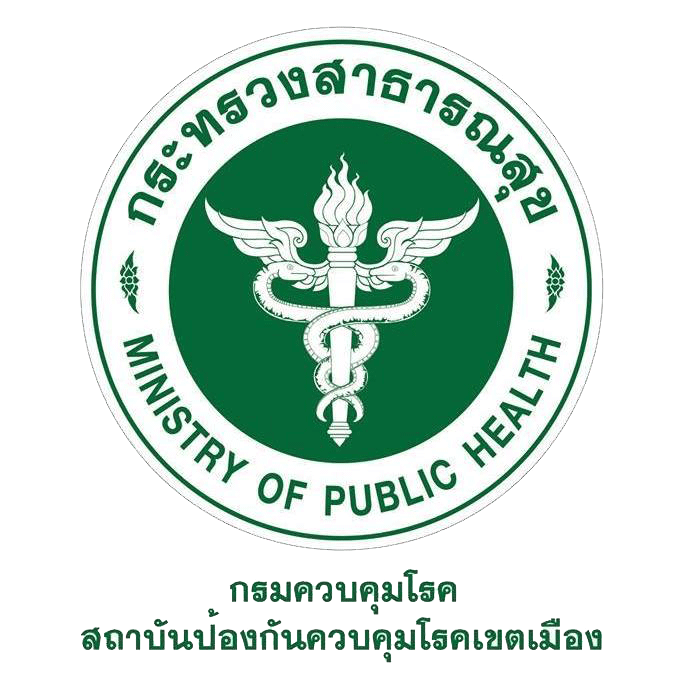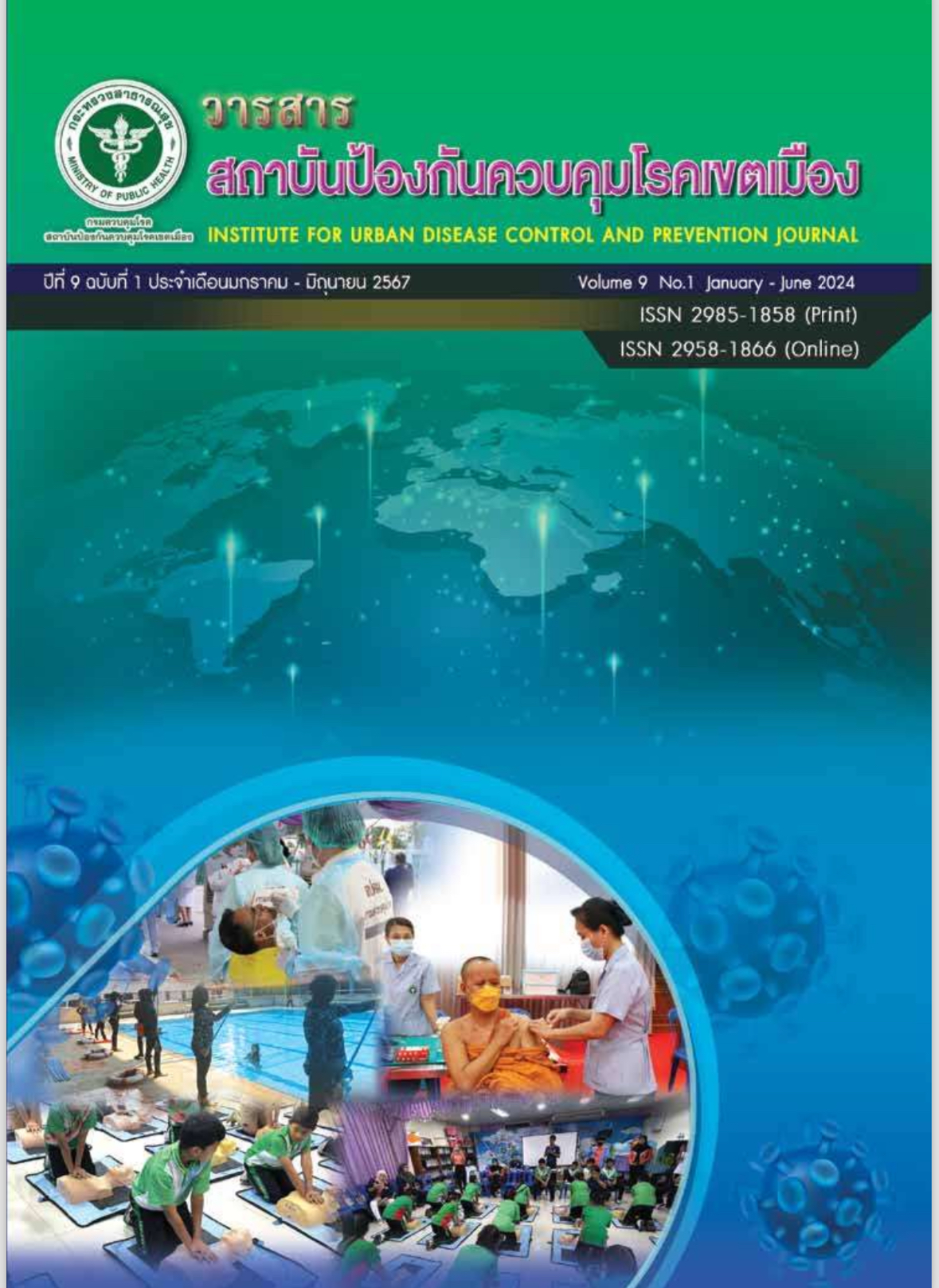ผลของโปรแกรมการสนทนาแบบสร้างแรงจูงใจต่อความรอบรู้ด้านสุขภาพ ของผู้ป่วยโรคเบาหวานชนิดที่ 2 รายใหม่
Main Article Content
บทคัดย่อ
การวิจัยแบบกึ่งทดลองชนิดสองกลุ่มวัดผลก่อนและหลังการทดลอง วัตถุประสงค์เพื่อศึกษาผลของโปรแกรมการสนทนาแบบสร้างแรงจูงใจต่อความรอบรู้ด้านสุขภาพของผู้ป่วยเบาหวานชนิดที่ 2 รายใหม่ ที่เข้ารับการรักษาและลงทะเบียนในคลินิกเบาหวาน โรงพยาบาลท่าใหม่ จังหวัดจันทบุรี กลุ่มตัวอย่าง คือ ผู้ป่วยโรคเบาหวานรายใหม่ จำนวน 56 คน ดำเนินการศึกษาระหว่างเดือนตุลาคม พ.ศ.2565 ถึงเดือนมีนาคม พ.ศ. 2566 เครื่องมือที่ใช้ในการทดลองเป็นโปรแกรมการสนทนาแบบสร้างแรงจูงใจ เพื่อให้เกิดความรอบรู้ด้านสุขภาพ 5 ระยะ ได้แก่ 1) การสร้างความร่วมมือระหว่างผู้บำบัดและผู้รับบำบัดผ่านการสนทนา 2) การค้นหาและทำให้แรงจูงใจในการปรับเปลี่ยนพฤติกรรมมั่นคงมากยิ่งขึ้น 3) การให้ข้อมูลและข้อเสนอแบบมีทางเลือกในการเปลี่ยนแปลงพฤติกรรมที่เป็นเป้าหมายของผู้รับบำบัด 4) ติดตามผลการลงมือปฏิบัติ และ5) สะท้อนผลการเปลี่ยนแปลงพฤติกรรม เครื่องมือที่ใช้เก็บข้อมูล ได้แก่ แบบสอบถามข้อมูลส่วนบุคคล แบบบันทึกการสนทนาสร้างแรงจูงใจ แบบบันทึกระดับน้ำตาลสะสม และแบบวัดความรอบรู้ด้านสุขภาพ วิเคราะห์ข้อมูลด้วยความถี่ ร้อยละ ค่าเฉลี่ย ส่วนเบี่ยงเบนมาตรฐาน เปรียบเทียบคะแนนความรอบรู้ด้านสุขภาพและระดับน้ำตาลสะสมในเลือดภายในกลุ่มทดลองและกลุ่มควบคุมโดยใช้สถิติ Paired t-tests และเปรียบเทียบคะแนนความรอบรู้ด้านสุขภาพและระดับน้ำตาลสะสมในเลือดระหว่างกลุ่มทดลองและกลุ่มควบคุมโดยใช้สถิติ Independent Sample t-tests
ผลการศึกษา พบว่า ภายหลังเข้าร่วมโปรแกรมการสนทนาแบบสร้างแรงจูงใจต่อความรอบรู้ด้านสุขภาพ กลุ่มทดลองมีระดับน้ำตาลสะสมในเลือดและความรอบรู้ด้านสุขภาพหลังการทดลองดีกว่าก่อนทดลองอย่างมีนัยสำคัญทางสถิติที่ระดับ 0.05 (t = 4.02, p < 0.001; t = -9.77, p <0.001) ส่วนกลุ่มควบคุมมีระดับน้ำตาลสะสมในเลือดและความรอบรู้ด้านสุขภาพก่อนการทดลองและหลังการทดลองไม่แตกต่างกันที่ระดับนัยสำคัญ 0.05 (t = 0.55, p = 0.587; t = 0.120, p = 0.905) และกลุ่มทดลองมีระดับน้ำตาลสะสมในเลือดและคะแนนความรอบรู้ด้านสุขภาพโดยรวมหลังการทดลองดีกว่ากลุ่มควบคุมอย่างมีนัยสำคัญทางสถิติที่ระดับ 0.05 (t = -4.07, p < 0.001; t = 9.45, p < 0.001) ข้อเสนอแนะการศึกษาครั้งนี้ชี้ให้เห็นความสำคัญของการสนทนาแบบสร้างแรงจูงใจที่ช่วยเพิ่มความรอบรู้ด้านสุขภาพของผู้ป่วยเบาหวานชนิดที่ 2 รายใหม่ ทำให้สามารถปฏิบัติพฤติกรรมสุขภาพที่เหมาะสมในการควบคุมความรุนแรงของโรค
Article Details

อนุญาตภายใต้เงื่อนไข Creative Commons Attribution-NonCommercial-NoDerivatives 4.0 International License.
บทความที่พิมพ์ในวารสารสถาบันป้องกันควบคุมโรคเขตเมือง ถือว่าเป็นผลงานวิชาการ งานวิจัยและวิเคราะห์ ตลอดจนเป็นความเห็นส่วนตัวของผู้เขียนเอง ไม่ใช่ความเห็นของสถาบันป้องกันควบคุมโรคเขตเมือง หรือคณะบรรณาธิการแต่ประการใด ผู้เขียนจำต้องรับผิดชอบต่อบทความของตน
เอกสารอ้างอิง
กรมควบคุมโรค สำนักงานโรคไม่ติดต่อ. สถานการณ์โรคไม่ติดต่อ. นนทบุรี: กระทรวงสาธารณสุข; 2561.
วิชัย เอกพลากร. รายงานการสำรวจสุขภาพประชาชนไทยโดยการตรวจร่างกาย ครั้งที่ 6 พ.ศ. 2562-2563. คณะแพทย์ศาสตร์โรงพยาบาลรามาธิบดี มหาวิทยาลัยมหิดล: อักษรกราฟฟิคแอนด์ดีไซน์; 2564.
ระบบคลังข้อมูลด้านการแพทย์และสุขภาพ [อินเทอร์เน็ต]. กรุงเทพฯ: กระทรวงสาธารณสุข; c2023. การใช้บริการสาธารณสุข; 2566 [เข้าถึงเมื่อ 2566 ตุลาคม 1]; [ประมาณ 1 น.]. เข้าถึงได้จาก: https://hdcservice.moph.go.th/hdc/main/index_pk.php
Kickbusch IS. Health literacy: addressing the health and education divide. Health Promot Int. 2001 Sep;16(3):289-97.
สมาคมโรคเบาหวานแห่งประเทศไทยในพระราชูปถัมภ์สมเด็จพระเทพรัตนราชสุดาฯ สยามบรมราชกุมารี. แนวทางเวชปฏิบัติสำหรับโรคเบาหวาน พ.ศ. 2566. กรุงเทพฯ: ศรีเมืองการพิมพ์ จำกัด; 2566.
วรรณี จิวสืบพงษ์, กฤษณา เหล็กเพชร, จันทิมา นวะมะวัฒน์, ปริทรรศน์ วันจันทร์. ความรอบรู้ด้านสุขภาพที่มีผลต่อความสามารถในการควบคุมระดับน้ำตาลในเลือดของผู้ป่วยโรคเบาหวาน ชนิดที่ 2. วารสารวิจัยและพัฒนาระบบสุขภาพ. 2565;15(3):30-43.
เทิดศักดิ์ เดชคง. ผลของโปรแกรมการสนทนาแบบสร้างแรงจูงใจต่อการควบคุมระดับน้ำตาลในเลือดสำหรับผู้ป่วยเบาหวานชนิดที่ 2. วารสารสถาบันบำราศนราดูร. 2563;14(3):134-45.
ระบบคลังข้อมูลด้านการแพทย์และสุขภาพ [อินเทอร์เน็ต]. กรุงเทพฯ: กระทรวงสาธารณสุข; c2023. ข้อมูลเพื่อตอบสนอง Service Plan สาขาโรคไม่ติดต่อ (NCD DM,HT,CVD); 2566 [เข้าถึงเมื่อ 2566 ตุลาคม 1]; [ประมาณ 1 น.]. เข้าถึงได้จาก: https://cti.hdc.moph.go.th/hdc/reports/page.php?cat_id=b2b59e64c4e6c92d4b1ec16a599d882b
เทอดศักดิ์ เดชคง. สนทนาสร้างแรงจูงใจเพื่อปรับเปลี่ยนพฤติกรรมสุขภาพ สำหรับผู้ป่วย NCDs Motivational Interviewing for NCDs; MI NCDs. กรุงเทพฯ: บียอนด์พับลิสชิ่ง จำกัด; 2560.
Prochaska, J. O., & DiClemente, C. C. Transtheoretical therapy: Toward a more integrative model of change. Psychotherapy: Theory, Research & Practice, 1982;19(3), 276–288.
Nutbeam D. The evolving concept of health literacy. Social Science and Medicine, 2008; 67(12), 2072-8.
อังศินันท์ อินทรกำแหง. การสร้างและพัฒนาเครื่องมือความรอบรู้ด้านสุขภาพของคนไทย, กองสุขศึกษา กรมสนับสนุนบริการสุขภาพ กระทรวงสาธารณสุข. 2560.
ชูสง่า สีสัน, ธณกร ปัญญาใสโสภณ. ประสิทธิผลของโปรแกรมความรอบรู้ด้านสุขภาพสำหรับผู้ป่วยโรคเบาหวานชนิดที่ 2 โรงพยาบาลปักธงชัย. วารสารการแพทย์โรงพยาบาล ศรีสะเกษ สุรินทร์ บุรีรัมย์. 2564;36(3):519-14. ภคภณ แสนเตชะ, ประจวบ แหลมหลัก. ผลของโปรแกรมพัฒนาความรอบรู้ด้านสุขภาพในผู้ป่วยโรคเบาหวานชนิดที่ 2 ตำบลแม่ปืม อำเภอเมือง จังหวัดพะเยา. วารสารสุขศึกษา. 2563;43(2):150-64.
รัตนาภรณ์ กล้ารบ, อรพินท์ สีขาว, และชฎาภา ประเสริฐทรง. ผลของโปรแกรมความรอบรู้ด้านสุขภาพสำหรับผู้ป่วยเบาหวานชนิดที่ 2 ที่ควบคุมระดับน้ำตาลในเลือดไม่ได้. วิทยานิพนธ์ปริญญามหาบัณฑิต มหาวิทยาลัยหัวเฉียวเฉลิมพระเกียรติ. 2564.
ชลธิชา อมาตยคง, โรชินี อุปรา, เอกชัย กันธะวงศ์. ประสิทธิผลของโปรแกรมการเรียนรู้เพื่อการเปลี่ยนแปลงต่อการส่งเสริมความรอบรู้ด้านสุขภาพในผู้สูงอายุโรคเบาหวาน. วารสารเครือข่ายวิทยาลัยพยาบาลและการสาธารณสุขภาคใต้. 2564;8(2):232-45.
ราตรี ทองคำ. ประสิทธิผลของการส่งเสริมความรอบรู้ด้านสุขภาพต่อพฤติกรรมการดูแลตนเอง ในผู้ป่วยเบาหวานชนิดที่ 2 จังหวัดลพบุรี. วารสารโรงพยาบาลสิงห์บุรี. 2565;30(3):86-99.


